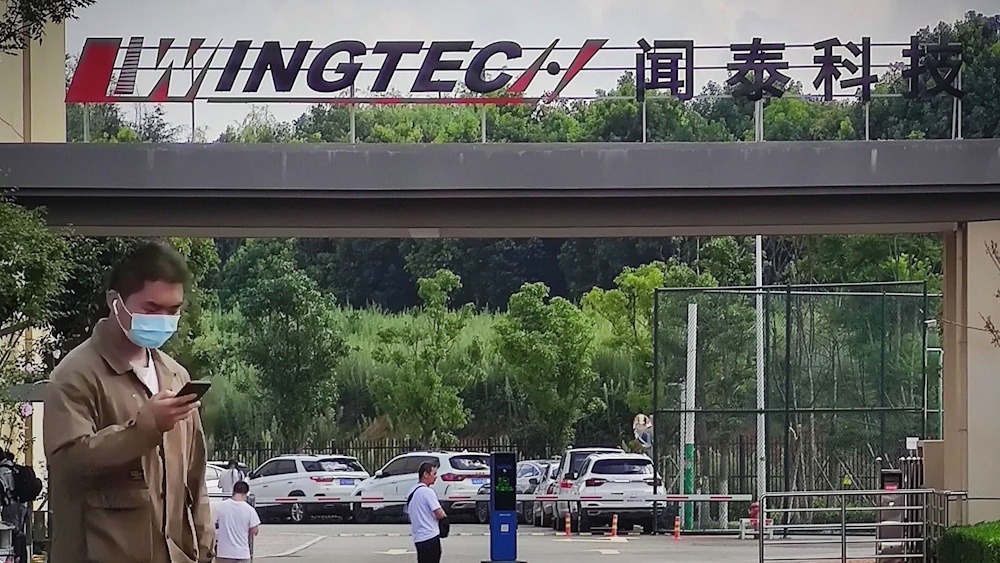
Shanghai-listed shares of Chinese chipmaker Wingtech experienced a decline of 10% on Tuesday, reaching the daily limit for the second consecutive session following the Dutch government’s acquisition of its Netherlands-based subsidiary Nexperia. The Minister of Economic Affairs in the Netherlands disclosed on October 12 that the decision, enacted under the “Goods Availability Act” regarding the company in September, aimed “to prevent a situation in which the goods produced by Nexperia (finished and semi-finished products) would become unavailable in an emergency.” Nexperia focuses on the mass production of semiconductors utilized in automotive, consumer electronics, and industrial applications, thereby playing a crucial role in sustaining Europe’s technological supply chains. In South Korea, the benchmark index experienced a reversal, concluding the session at 3,561.81, which reflects a decline of 0.63%, following its peak at an all-time high of 3,646.67. The construction and mining sectors spearheaded the advancements on the index, with Korea Zinc experiencing an increase exceeding 20%, while Tongyang Inc surged by nearly 30%.
LG Energy Solution experienced a closing increase of 6.94%, marking a second consecutive day of gains. This uptick follows the company’s projection of a 34% rise in third-quarter operating profit, driven by heightened U.S. demand for electric vehicles in anticipation of the upcoming phaseout of government incentives on September 30. Samsung Electronics’ stock reversed its earlier gains, finishing 1.82% lower despite the company forecasting a 32% increase in third-quarter profit year on year, estimated at approximately 12.1 trillion Korean won, surpassing LSEG SmartEstimates of 10.1 trillion won. Shares of shipping company Hanwha Ocean reduced their earlier losses to 5.76%, following the sanctioning of five U.S.-related units of Hanwha Marine Corporation by China’s Ministry of Commerce on Tuesday. The action taken was a direct response to the U.S. investigation into Chinese maritime, logistics, and shipbuilding sectors, which the ministry asserted “seriously violate international law and basic norms governing international relations, and severely damage the legitimate rights and interests of Chinese companies.”
The order, effective October 14, will restrict organizations and individuals in China from engaging in business with the sanctioned companies, according to the statement. Meanwhile, the small-cap Kosdaq experienced a reversal, declining by 1.46% to settle at 847.96. Japan’s benchmark index experienced a decline of 2.58%, concluding at 46,847.32, while the Topix recorded a loss of 1.99%, closing at 3,133.99. SoftBank’s shares continued their downward trajectory, decreasing by 6.14% following reports that its subsidiary, British chip designer Arm, is collaborating with OpenAI regarding its agreement with Broadcom, as noted by tech publication The Information. On Monday in the United States, OpenAI and Broadcom formalized their collaboration to develop and implement 10 gigawatts of artificial intelligence accelerators, with plans to commence in late 2024. India’s benchmark Nifty 50 experienced a decline of 0.55%, whereas the Sensex index recorded a decrease of 0.53%. LG Electronics India experienced a remarkable 50% surge on its debut, reflecting the highest demand for an Indian IPO since 2008. Australia’s ASX/S&P 200 experienced an increase of 0.19%, reaching a level of 8,899.4. The Hang Seng Index in Hong Kong experienced a decline of 1.74%, whereas the Hang Seng Tech Index saw a more significant drop of 3.7%. Mainland China’s CSI 300 experienced a decline of 1.2%. Preliminary government data released on Tuesday indicated that Singapore’s economy expanded by 2.9% in the third quarter, surpassing the 1.9% growth anticipated by economists surveyed by Reuters. The economy experienced an expansion of 4.4% during the second quarter.
U.S. equity futures exhibited minimal variation during the early hours of trading in Asia. On Monday in the United States, the primary indices regained a substantial portion of the declines experienced the previous week following a moderation in U.S. President Donald Trump’s position regarding China. In the wake of a series of reciprocal trade measures and intense dialogues, Trump remarked, “Don’t worry about China, it will all be fine!” in a post on Truth Social Monday. On Tuesday, Beijing announced the initiation of port fee collections on vessels associated with the U.S., a move seen as a response to the U.S. decision to impose charges on Chinese ships arriving at American ports starting at 12:01 a.m. that day. Overnight, the Dow Jones Industrial Average experienced an increase of 587.98 points, representing a rise of 1.29%, bringing it to a level of 46,067.58, which accounts for 67% of its loss from Friday. The S&P 500 increased by 1.56%, concluding at 6,654.72, thereby recovering 56% of its previous downturn. The Nasdaq Composite increased by 2.21%, closing at 22,694.61, driven by a resurgence in underperforming technology stocks.
